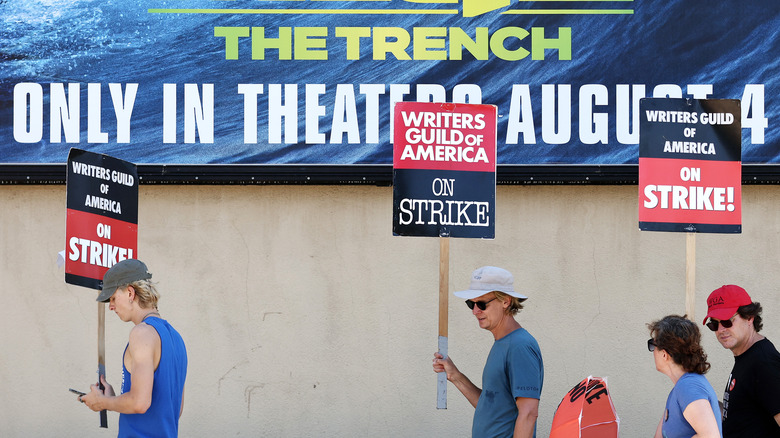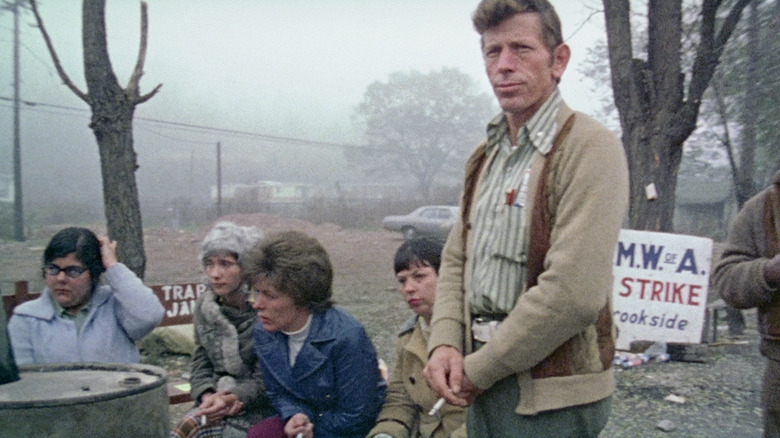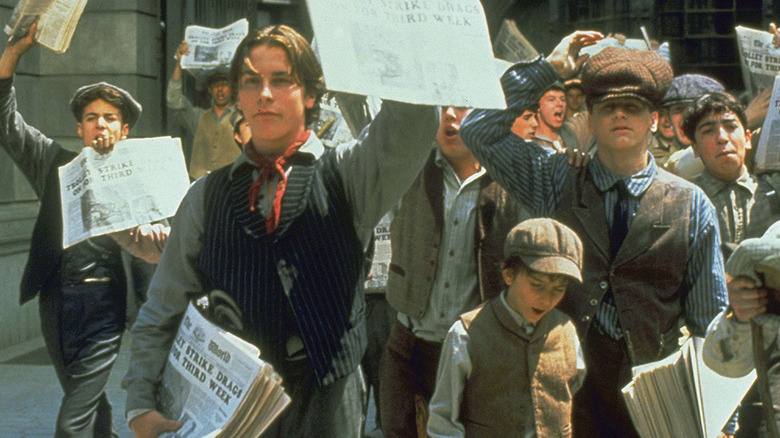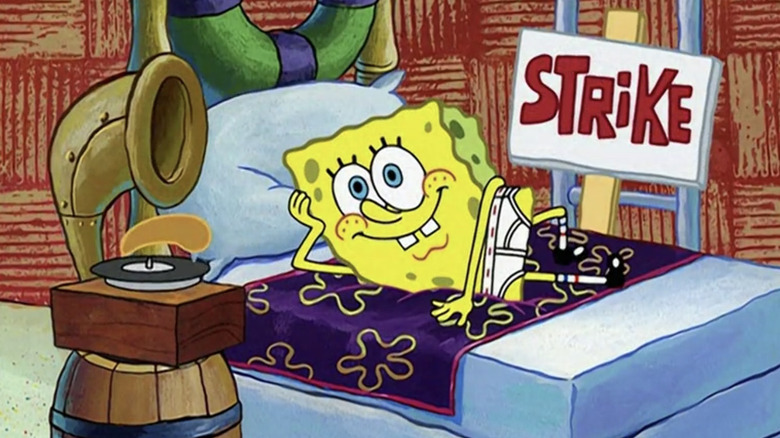100-Plus Days Into Hollywood's Strikes, Here's What You Need To Know
113 days into the Writers Guild of America strike against the Alliance of Motion Picture and Television Producers, there appeared to be a glimmer of hope. The AMPTP had at long last reached out to the WGA's negotiating committee with a new counteroffer that would hopefully bring both sides closer together, and, thus, hasten an end to a work stoppage that mushroomed on July 14 to include the Screen Actors Guild — American Federation of Television and Radio Artists. Both sides met on Tuesday evening, and, well, the meeting went poorly.
AMPTP president Carol Lombardini was joined by Warner Bros. Discovery's David Zaslav, Disney's Bob Iger, Universal's Donna Langley and Netflix's Ted Sarandos, but, rather than negotiate, the quintet launched into a lecture about the quality of their counteroffer — which was their first and, evidently, final counteroffer. When the WGA negotiators pushed back on the counteroffer's numerous "limitations and loopholes," the AMPTP leaked the details of the proposed deal to the press. The WGA was understandably furious (it's the committee's job to take any proposed deal to their membership), which prompted a fiery condemnation of the AMPTP's bad-faith tactics.
We are now even further into the strike, and if the AMPTP's goal this past Tuesday night was to redouble the writers' resolve, while needlessly keeping scads of people out of work, mission accomplished. And yet, if the AMPTP can bring themselves to behave like semi-decent human beings, there may be a way forward.
Let's take a look at their proposal (which you can read in its entirety here).
The AMPTP proposal
The AMPTP has offered a compounded 13% increase over the three year contract, which, they boast, is the highest wage increase for the union in 35 years. Meanwhile, minimum weekly rates would go up 15% in the first year of the agreement with additional increases over the next two years.
The most attractive element of the counteroffer is undoubtedly the boost in domestic and foreign residuals, which would go up from $72,067 to $87,546 per episode over three exhibition years.
But the proposal is suspiciously vague when it comes to issues of viewership numbers (which the streamers have been extremely reluctant to provide) and Generative Artificial Intelligence. Here's the AMPTP's exact language on viewership:
"For the first time, viewership data in the form of quarterly confidential reports is to be provided to the WGA that will include total SVOD view hours per title. This increased transparency will enable the WGA to develop proposals to restructure the current SVOD residual regime in the future."
There is no excuse for viewership data to be this closely guarded. All this does is place the WGA negotiators and elected board members in the awkward position of withholding these numbers from their fellow writers. It also kicks an agreement on SVOD residual payments way too far down the road. This needs to get hashed out now.
As for AI, while the proposal states "Written material produced by GAI will not be considered literary material," and "A writer will not be disadvantaged if any part of the script is based on GAI-produced material, so that the writer's compensation, credit and separated rights will not be affected by the use of GAI-produced material," there's all kinds of wiggle room here. This lack of specificity is the overall problem with this offer. And when you lecture adults that they have no idea how good they'll have it should they accept said offer, you end up with some highly cheesed-off people.
The WGA's response
Though some WGA members have expressed cautious optimism over a few of the AMPTP's concessions, the consensus is that this is a ploy to cause dissension in the ranks. As the WGA noted in a recent press release: "This was the companies' plan from the beginning — not to bargain, but to jam us. It is their only strategy — to bet that we will turn on each other."
The statement also addresses the myriad of vagaries in the AMPTP's offer:
"We explained all the ways in which their counter's limitations and loopholes and omissions failed to sufficiently protect writers from the existential threats that caused us to strike in the first place. We told them that a strike has a price, and that price is an answer to all — and not just some — of the problems they have created in the business."
The entire counteroffer didn't land flat. In an interview with The Hollywood Reporter, "Brooklyn Nine-Nine" writer Andy Bobrow expressed cautious optimism over the residuals hike:
"For comparison, my 'Malcolm in the Middle' episodes have gotten me around $60,000 per episode over a period of 15 to 20 years, and that show syndicated about as well as you can do. The producers' high-budget streaming proposal is $87,000 over a period of only three years. And that would be for every show, not just the hits."
But if you're looking to take the temperature of the WGA negotiating committee, you need look no further than "The Wire" creator David Simon, who stated on whatever we're calling Twitter nowadays:
"Honestly, I'm amazed the CEOs could so misperceive the landscape as to believe a tone-deaf lecture and the timed leak of a substandard, don't-read-the-fine-print offer might peel away any WGA members. They have no sense of the anger and commitment on the picket lines. #WGAStrong"
When will Hollywood get back to work?
The AMPTP, in their ultimate wisdom, opted to fight a two-front labor war by not only low-balling SAG-AFTRA, but proposing to make digital replicas of background performers that could be used in perpetuity sans remuneration to the actor. So when they finally reach an agreement with the WGA, they'll have to negotiate with another, equally furious union. Only then will the film and television industry get back up and running.
And this is concerning because, thus far, studio executives have bragged about dragging out the stoppage until writers are facing homelessness. Such sentiments have been fuel for strikers, who are still showing up to the picket lines in shockingly significant numbers every day. Though some of the unions' biggest earners have been doing what they can to support the workaday rank-and-file, there will come a time when rent and bills will pile up to a potentially insurmountable degree.
I do not doubt union members' determination, but I also wonder if these execs, who've been watching their companies' stock prices plunge since the start of the WGA strike, would rather break the system and float off on their golden parachutes than do right by the artists who've made them wealthy.
All I know for sure is this: The entertainment industry is going to look radically different once these deals get done. If they get done.



